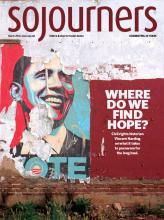Ada María Isasi-Díaz is a leading voice of mujerista theology, a liberation theology rooted in the everyday experience of Latinas. As her foundational 1996 book Mujerista Theology: A Theology for the Twenty-First Century puts it, her work aims at creating “a public voice for Latinas and capturing a political space for that voice,” including in academic theology. Isasi-Díaz is professor emerita of ethics and theology at Drew University in Madison, New Jersey. Sojourners associate editor Elizabeth Palmberg interviewed her in November at the Call to Action conference in Milwaukee.
Elizabeth Palmberg: The U.S. will soon reach a demographic tipping point at which no ethnic group is in the majority. What challenges and opportunities do you see this presenting to Latina spirituality, and to the nation as a whole?
Ada María Isasi-Díaz: We’re either going to have a radical change in perspective or continue to have enormous inequality and ill-treatment of people whom we see as “other”—who don’t look like those in power, are not white, and so forth. The tipping point means that the hour of reckoning is coming. One of the things we need to work on is: How do we change? How do we understand differences?
We have always equated differences with incompatibility, but that’s not true. Many differences are not incompatible. That’s the kind of work that we need to demand of our leaders—church leaders, political leaders. We need to talk about differences; we can’t just sweep them under the rug. Differences do not have to divide us; they can enrich us.
Read the Full Article
